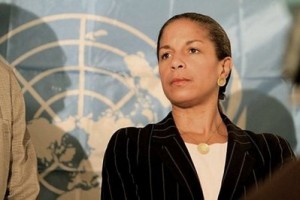 The United States is “disgusted” by Russia and China’s decision to veto a U.N. Security Council resolution today that called for an immediate end to the violence in Syria, U.S. Ambassador to the U.N. Susan Rice said today.
The United States is “disgusted” by Russia and China’s decision to veto a U.N. Security Council resolution today that called for an immediate end to the violence in Syria, U.S. Ambassador to the U.N. Susan Rice said today.
The Security Council vote today came on one of the bloodiest days of the popular uprising in Syray, as President Bashar al Assad’s security forces launched a withering artillery assault on the city of Homs that has reportedly left 200 to 400 dead.
Though they were the only negative votes in a 13 to 2 vote, Russia and China’s veto power as permanent members of the Security Council killed the resolution drafted by Arab and European countries.
The vetoes came after a week of intense negotiations to gain Russian support for a resolution it had opposed from the start. The resolution supported an Arab League plan that called for an immediate end to the violence in Syria and a political solution to the crisis. Russia was opposed to the resolution because of concerns that it could leave an opening for a foreign intervention against one of its loyal client states.
The vetoes drew harsh criticism from Security Council members that supported the resolution and who had amended it several times to ease those concerns, rewording language about the transition of power and watering down the possibility of future sanctions against the Assad regime.
“The United States is disgusted that a couple of members of this Council continue to prevent us from fulfilling our sole purpose,” U.S. Ambassador Susan Rice said. “For months this Council has been held hostage by a couple of members,” she said, referring to Russia and China, who she said had been “delaying and stripping bare any text to force Assad to stop his actions.”
Without referring to Russia by name, she said the vetoes were “even more shameful” given that Russia has continued to sell weapons to to Syria. She called the vetoes “unforgivable” and said “any further blood that flows will be on their hands.”
In brief remarks to the Council, Russian Ambassador Vitaly Churkin said Russia actively supports an end to the violence in Syria, but that the resolution did not “accurately reflect the real state of affairs” in Syria and “sent an unbalanced signal to the parties.” Churkin was speaking about armed opposition groups that have also been conducting violent attacks against the Assad regime in Syria.
He once again cited Russian concerns about “regime change” by “influential members of the international community who have been undermining the possibility of a settlement in Syria.”
French Ambassador Gerard Araud said the vetoes were a “sad day for the UN Security Council … a sad day for democracy and a sad day for Syrians. … Hundreds of Syrians are dying and it is no longer possible to wait. ”
Peter Wittig, the German ambassador to the United Nations criticized the vetoes particularly for having come on “one of bloodiest days of the Arab spring” and the 30th anniversary of the massacre in Hama, Syria ordered by Assad’s father that resulted in 20,000 dead.
“This is the real scandal,” Wittig said. “Afraid this will spur further violence and make it difficult to reach a political solution.”
British Ambassador to the U.N. Mark Lyall said Russia and China should “ask themselves how many more deaths they are prepared to tolerate.”
He said the negotiations had “removed every possible excuse” for voting against the resolution. He also said that the United Kingdom and other countries would continue their efforts to stop the violence in Syria.
Li Baodong, China’s Ambassador to the UN told Council members that China voted against the resolution because it would “further complicate the situation” in Syria.
He also said that China supported the Russian delegation’s last minute calls for a delay on the vote as well as amendments proposed by Russia that were not taken up by the Council.
ABC

Leave a Reply
You must be logged in to post a comment.